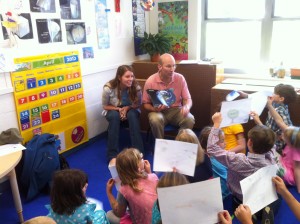 Teaching Sunday School on Earth Day
Teaching Sunday School on Earth Day
On the Sunday before Earth Day, I was part of a small group of parishioners in my church who visited Sunday school classes and talked about Earth Day with the kids. One question we asked each class was whether, in their opinion, we as humanity were doing a good job or a bad job in how we were treating the planet. It was fascinating to see how each age group reacted.
Most of the first graders thought we were doing a great job but the third graders responded with an unhesitant and resounding chorus of “Bad!” Some had looks in their eyes as they said this as if they felt very personally the tragedy of how humanity treats Mother Earth. In the two years between first grade and third grade, some innocence about the state of the world is lost obviously. “Well, we’re doing a good job, except for some adults,” said one very wise first grader.At first I chuckled at his honest answer but I quickly sobered. How shrewd of this little boy to understand that adults don’t always do what’s right and at 6 or 7 years old he already understood that when some of us don’t uphold our responsibilities, everyone gets hurt. What I heard in his answer was that there were a lot of people who were trying to do very good things, but their efforts were being thwarted, purposefully or inadvertently, by some adults who didn’t quite get it. Bless these kids who are so smart and already so aware of how collective action is necessary for a sustainable world.
I rent a small basement apartment in a relatively affluent neighborhood, and since moving here I’ve witnessed an interesting phenomenon among homeowners. A lot of people here want to be “green” and they intellectually understand why that’s important; they understand the unsustainable nature of how we currently use fuel and natural resources, they know about runoff water issues and habitat loss and the whole long and sorry list of environmental problems. And yet they don’t seem to really get it. It is as if they are stuck too deeply in the cultural worldview that money and technology can fix all their problems and they don’t think their actions through completely. They are what I like to call “surface greenies” or “light green.” I’ll give you an example.
One couple I know decided they needed to start composting in order to reduce the amount of waste they produce. First, they bought a large and expensive machine that turns your compost for you, which they say failed after one week. It sits by their garage even today. Now, they hire a service to drive a pickup truck to their house once a week, empty their half full compost bucket, and haul it away. They laud themselves for being so green, but how many resources are they actually responsible for consuming considering the rusting compost machine and the gas for the pickup truck that comes every week, when they could have composted everything themselves in their own yard? Sometimes as busy adults, trying to do the right things, we get caught up in the image of being green or gimmicks that claim to help us become greener while really they turn a profit.The best green solutions start at home: Consume less, waste less
Less comes in, less goes out. This applies to how we consume and use energy and how much ends up being wasted because of energy efficiency problems or wasteful habits. It goes for food too. Fresh, unprocessed foods brings fewer chemicals, calories, and cholesterol into your home and can be composted in your kitchen and put on your plants, reducing how many bags you drag to the curb for trash pickup. This rule also applies for plastics and toys. Be conscious about how necessary is that plastic bag or that umpteenth bottle of water or that toy you know will be abandoned in a week. I try to live a simple and sustainable lifestyle. By reducing the amount of stuff I have, and the energy I use, and the waste I produce, I find that life becomes more meaningful, less cluttered, less stressful, and less expensive. This Earth Day, let’s spend a little time thinking critically about how we’re upholding our responsibilities to all those first and third graders. Where are we missing easy opportunities to consume less and waste less? Are the strategies we’re currently using truly effective in the end? Are we light green or deep green when it comes down to it?There are many tip lists out there that can help generate ideas for how to be greener at home. Here are some of ABET’s:
Schedule a Home Energy Audit to find where your house is losing energy. 10 Water Saving Tips You Aren’t Using The Environmental Footprint
Tags
Subscribe to NV Roofing's Blog



